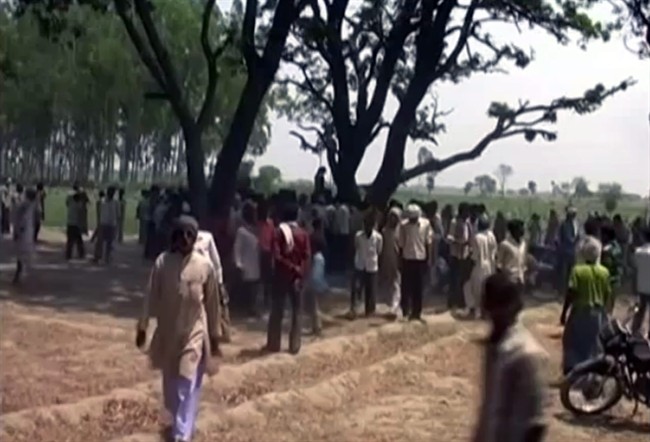LUCKNOW, India – Two teenage sisters in rural India were raped and killed by attackers who hung their bodies from a mango tree, which became the scene of a silent protest by villagers angry about alleged police inaction in the case. Two of the four men arrested so far are police officers.

Villagers found the girls’ bodies hanging from the tree early Wednesday, hours after they disappeared from fields near their home in Katra village in Uttar Pradesh state, police Superintendent Atul Saxena said. The girls, who were 14 and 15, had gone into the fields because there was no toilet in their home.
READ MORE: Court confirms death sentence in India gang rape
Hundreds of angry villagers stayed next to the tree throughout Wednesday, silently protesting the police response. Indian TV footage showed the villagers sitting under the girls’ bodies as they swung in the wind, and preventing authorities from taking them down until the suspects were arrested.
Police arrested two police officers and two men from the village later Wednesday and were searching for three more suspects.

Get daily National news
Autopsies confirmed the girls had been raped and strangled before being hung, Saxena said.
The villagers accused the chief of the local police station of ignoring a report by the girls’ father Tuesday night that the girls were missing. The station chief in Katra, 180 miles (300 kilometres) southwest of the state capital, Lucknow, has since been suspended.
- Timothy Busfield released from jail pending trial in child sex abuse case
- Man who killed former Japanese prime minister sentenced to life in prison
- Canada approves permanent residency for family of Ottawa mass murder victims
- Hearings begin at Supreme Court on constitutionality of random police traffic stops
READ MORE: India police charge 6 in gang rape of young woman
The family belongs to the Dalit community, also called “untouchables” and considered the lowest rung in India’s age-old caste system.
Records show a rape is committed every 22 minutes in India, a nation of 1.2 billion people. Activists say that number is low because of an entrenched culture of tolerance for sexual violence, which leads many cases to go unreported. Women are often pressed by family or police to stay quiet about sexual assault, and those who do report it are often subjected to public ridicule or social stigma.
India tightened its anti-rape laws last year, making gang rape punishable by the death penalty, even when the victim survives. The new laws came after the fatal gang rape of a 23-year-old woman on a bus in New Delhi that triggered nationwide protests.
Health workers, police and women’s rights activists say women and girls face the risk of rape and harassment when they go out into fields or bushes due to the lack of toilets in their homes.
More than a half billion Indians lack access to toilets. A recent study said around 30 per cent of women from poor families faced violent sexual assaults every year because they did not have access to a safe toilet.
READ MORE: Satirical ‘It’s my fault’ victim-blaming rape video goes viral
Last month, the head of Uttar Pradesh state’s governing party, the regionally prominent Samajwadi Party, told an election rally that the party was opposed to the law calling for gang rapists to be executed.
“Boys will be boys,” Mulayam Singh Yadav said. “They make mistakes.”





Comments